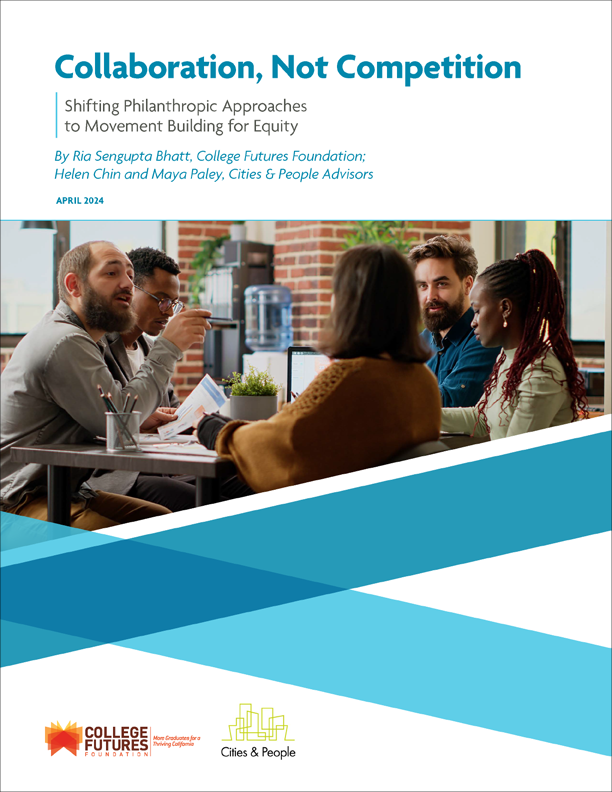Publications & Research
Collaboration, Not Competition: Shifting Philanthropic Approaches to Movement Building for Equity
 Coauthored by College Futures and Cities & People
Coauthored by College Futures and Cities & People
The COVID-19 pandemic exacerbated existing inequities and brought about monumental new challenges for California’s students and educational institutions. In May 2020, College Futures Foundation—a strategic philanthropy committed to increasing equitable postsecondary success and upward mobility so that California’s economy and communities can thrive—virtually convened a group of nine grantee organizations seeking space to make sense of the pandemic’s early impact on postsecondary students and systems. Over the following months, as the pandemic deepened inequities in students’ lives and reinforced the need for responsive policy intervention, the Foundation reconsidered how its state policy-focused grantmaking strategy could serve as a vehicle to support movement-building in higher education in California. At a time when many grantees were forced to operate in crisis mode, College Futures deliberately aimed to foster a sense of care, support, and community, paired with stable and flexible funding. This was the start of a new policy grantmaking strategy that eventually grew to an “ecosystem” of 16 organizations, intentionally designed to advance connections, knowledge, and movement-building across higher education equity.
To understand the usefulness of the Policy Ecosystem strategy for grantees and its impact on their work, College Futures Foundation enlisted Cities & People Advisors, an equity-based consulting firm, to lead a comprehensive learning engagement. We learned from Policy Ecosystem grantees that College Futures’ strategy stood out from their usual experiences with funders. The status quo experiences are well-known in our field: many in philanthropy do not fund policy advocacy at all and, when advocacy is funded, it might be for just one or two organizations in a field, perpetuating ongoing competition for resources from organizations with the same objectives.
Other contrasts were more nuanced, generating valuable insights for philanthropy in education, as well as beyond education to other justice and equity movements. Taking lessons from grassroots organizing, College Futures adjusted its policy grantmaking strategy from solely issuing individual grants to also convening and supporting an ecosystem of values-aligned organizations with varying approaches and focus areas. Through agile, responsive, and well-facilitated quarterly convenings, grantees explored changing trends in higher education, leveraged each other’s expertise, and discussed organizational priorities. The collective space was augmented by individualized guidance from program officers to bolster grantees’ organizational approaches and comparative strengths, as well as periodic consultant support for shared efforts across grantees.
We at College Futures and Cities & People offer the following insights to the philanthropic community to strengthen equity-focused movement-building and grantmaking, especially in support of statewide policy and systems change. Our experience showed that some of the approaches and strategies launched during the pandemic remain powerfully effective in 2024 and beyond.
